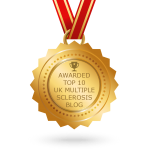Partially sighted
Its June 2012, a friend of my wife stayed with us for the weekend. She was diagnosed with multiple sclerosis in 1984, recently she had a relapse and is almost blind.

She can only see around the edges, the centre is a grey blob
MS was a double tragedy
She has very poor vision. in fact it is very limited peripheral vision. The loss of sight took place very rapidly and it occurred when she was in her mid fifties. The effect of MS was life changing, it made her almost blind, her career in the art world had stop as did her art teaching. This post talks about how she copes and what she uses to help her with day to day life. To look at her you would not know she has a disability.
The disability
Imagine that you are looking at a person’s face but you cannot see their eyes, mouth, or expression on their face, there is nothing there, it is just an empty space. Facial expressions add so much to a conversation, for her it must be like having a telephone conversation. If you have ever done a telephone interview or a conference call by phone then you can begin to understand the problems she has to cope with all the time.
Can you imagine?
When you or I go shopping we are able to see everything in one glance and then select what interests us. She has to look at each item one at a time before making a decision, obviously this makes the process much slower and very frustrating. Retail therapy is a very different exercise for her.
She admits to being a bit of a Luddite, does not understand modern technology. Any device with small buttons is virtually impossible to use so a mobile phone is out of the question and she cannot get to grips with a computer keyboard. The RNIB do provide equipment with much larger large buttons but she still does not want a mobile phone.
Coping strategy
She uses a monocular to see objects at distances which people with normal vision do not have any difficulty seeing.
To read a book or a newspaper she uses a square magnifying glass but does find this a very frustrating process. A circular one will only show a few letters at a time, making it much more difficult to make sense of what she is trying to read. A good light obviously makes reading much easier. Talking books and books in large print are a big help to her.
She can watch TV but must only be about 40 to 50 cm (15 to 20 inches) from the screen and has to have a seat in the front row of the cinema. In fact she has been known to sit on the floor so she is even closer to the screen.
She will use a white stick as a signal to tell other people that she is visually impaired. As her peripheral vision is good there is no need to use the stick to identify steps, kerbside etc.
Often she will use her camera to take a picture of what she would like to look at, especially peoples faces. She can make sense of an image that is shown on a modern digital camera screen.
Which is worse?
To lose any sense is difficult, I still do not know which is the more important one, sight or sound. My mother was profoundly deaf, our friend is nearly blind, the jury is still out on this case. To lose either is devastating and this makes my disability, squiffy balance, stiff joints, foot drop and double vision seem so much more trivial.
My disability is very obvious and people go out of the way to help me if I am in difficulty. Her problems are far from obvious to so many people but it is the same disease. It really is a horrible disease.



Leave a Reply